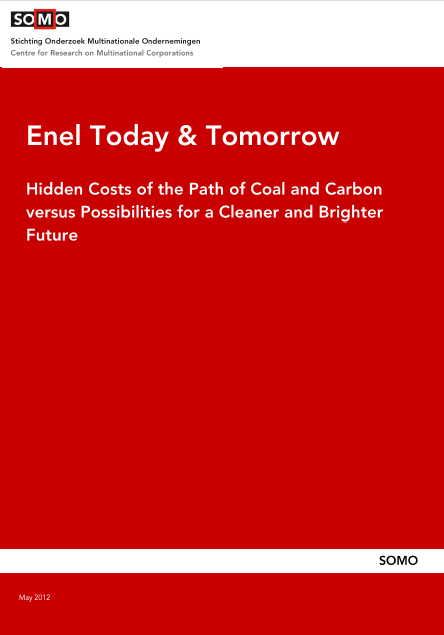
Enel’s court case against Greenpeace Italy
“As a direct consequence of power generation by multinational company Enel, the largest coal consumer in Italy, 366 deaths occur prematurely in Italy every year.” This message created quite a stir in the Italian media following the publication of the report on the situation by SOMO, commissioned by Greenpeace Italy.
Annual reports prove insufficient to fully understand the consequences of the operations of power companies such as Enel. The ‘hidden price’ of power generation, paid by the surrounding nature and population, is not inclusive in the pretty marketing promises Enel makes about ‘sustainability’ and ‘social solidarity’.
Joseph Wilde-Ramsing, SOMO researcher, confirms the facts: "Generating electricity has more negative consequences than merely financial cost. There is a clear connection between the substances being emitted by the coal-fired power plants and the damage being wreaked on the surrounding nature and population."
Method and results
This connection has been explored in the ‘Enel Today and Tomorrow‘ report. The research followed the methodology as previously developed by the European Environment Agency (EEA). However, where the European Environment Agency only calculated the financial consequences, SOMO has modified the calculation model in such a way as to provide hard figures for the health impact on the Italian population.
In SOMO’s report the impact has been expressed in the number of people who have died prematurely as a result of the toxic substances emitted by the coal-fired power plants of Enel in Italy. In 2010 this was 366 people. The total damages resulting from this are estimated to amount to €1,772 million in 2010.
Court case in Italy
In June 2012 Greenpeace Italy, who commissioned this research, was sued for libel by Enel. The judge, however, determined that the Greenpeace campaign was based on fact, scientifically proven by the research report of SOMO. This report has been checked by various independent parties.
The demands made by Enel, namely the shut-down of the Greenpeace-website(opens in new window) and compensation for damage to reputation, were therefore refused by the court. The court also ordered all costs accrued by these legal proceedings must be paid by Enel.
Related news
-
 CSDDD Datahub reveals law covers fewer than 3,400 EU-based corporate groupsPosted in category:News
CSDDD Datahub reveals law covers fewer than 3,400 EU-based corporate groupsPosted in category:News David Ollivier de LethPublished on:
David Ollivier de LethPublished on: -
 Additional evidence filed against Booking.com for profiting from illegal settlementsPosted in category:News
Additional evidence filed against Booking.com for profiting from illegal settlementsPosted in category:News Lydia de LeeuwPublished on:
Lydia de LeeuwPublished on: -
 The hidden human costs linked to global supply chains in ChinaPosted in category:News
The hidden human costs linked to global supply chains in ChinaPosted in category:News Joshua RosenzweigPublished on:
Joshua RosenzweigPublished on:

